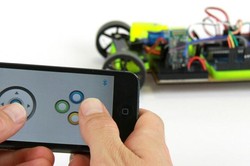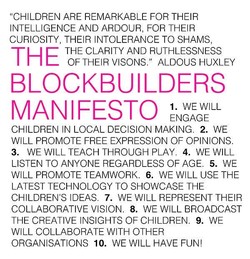
We can’t stop this trend - if you want to try and tell children where to spend their time, then good luck to you. But what these companies have done, instead of trying to force technology into our outdated teaching methods, is to use the technology to create new methods of teaching and engaging children with learning.
MakerClub

The projects, like the Carduino, come with their MakerConnect chip and app which allows all these robots to be controlled by your smartphone.
Instead of dumbing down the projects to make them ‘child-friendly’, they intend to use a gamified learning system to ensure Makers of all ages and experience levels can create their projects, and to give them the skills and the science to go away and create their own custom builds.
But why robots? Founder and CEO of Maker Club, Simon Riley stated;
“ Robots are such great learning tools, giving people a hands on way to understand electronics, the basics of 3D design and then how to code. - it’s also a fantastic family activity”
These projects are available from their IndieGoGo campaign.
BlockBuilders

BlockBuilders run workshops where they encourage children to re-create their local areas in Minecraft, explore them using the Oculus Rift VR headset, and then present their ideas to the local council, thus engaging children in their local community in a way that is fun and relatable to them.
That’s why projects such as BlockBuilders are so important - they teach children that, no matter their age, they have a voice and influence within their local community.
Follow BlockBuilders on twitter to hear about upcoming events.
Zondle
Zondle is a gamified learning app with over 60 different games used to support teaching, learning and assessment in ‘any subject, any language, anywhere’. They aim to harness the obsessive motivational power of an addictive video game, with ignorance as your nemesis and knowledge your only weapon.
According to the scientific research provided by the Universities of Oxford and Bristol, pleasure and rewards cause the creation of ‘synaptic dopamine’ - a chemical that causes that sense of achievement after a good meal or a solid days work - that aides the ‘long term encoding of memory’. So as kids beat levels, they feel a sense of achievement that they associate with learning, and that helps them remember what they’ve just learnt.
Zondle is available on both Google Play and iTunes.
Gojimo

The app itself is a series simple multiple choice quizzes, but what’s really impressive is it’s scope. Chemistry, French, Geography, Design Tech, Latin, Shakespeare; even Commercial Law and Etiquette!
Dream Learners
Any parent knows that a child’s mind (and their scampering little bodies) is most active just as you want them to go to sleep, so combining extra-curricular learning with a soothing but engaging narrative sounds like a great way to kill two birds with one stone. I don’t know whether your children will dream of the alphabet or quadratic equations, but sleep has been shown to consolidate long-term memories and learning.
You can apply to beta test Dream Learners on their website.
Learning through stories from Dream Learners on Vimeo.
Ben Flowers an Ed tech writer and the Content Manager & Researcher at MakerClub.org, working to give Today's learners Tomorrow's skillswith 3D printed educational robotics. You can find him in the MakerLabHQ or at [email protected].
MakerClub is currently running an IndieGoGo campaign, providing learners of all ages the skills to make 3D printed robotics.












